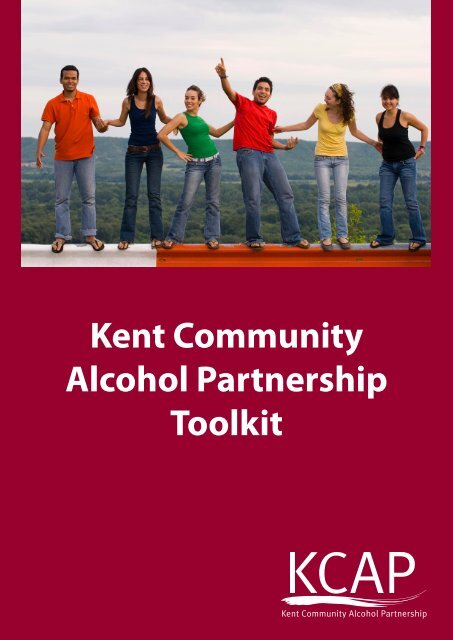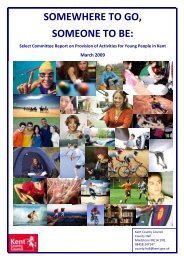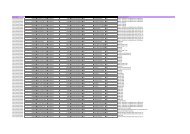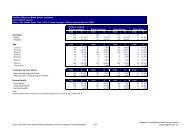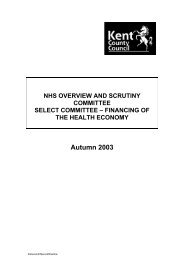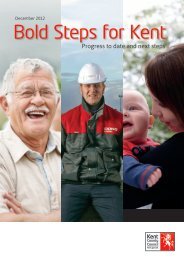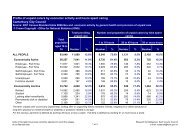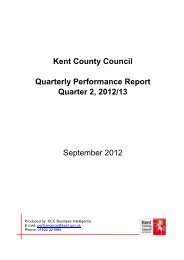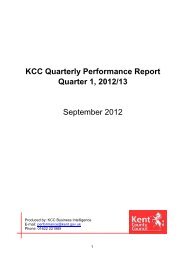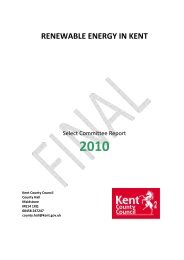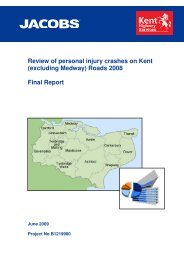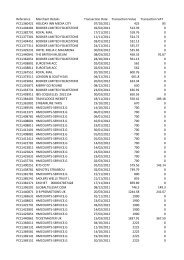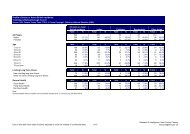KCAP toolkit - Kent County Council
KCAP toolkit - Kent County Council
KCAP toolkit - Kent County Council
Create successful ePaper yourself
Turn your PDF publications into a flip-book with our unique Google optimized e-Paper software.
<strong>Kent</strong> Community<br />
Alcohol Partnership<br />
Toolkit
Contents<br />
Introduction 04<br />
Initial process for launch of a <strong>KCAP</strong> area 06<br />
Appendix A – University of <strong>Kent</strong> Executive Summary 10<br />
Appendix B – <strong>KCAP</strong> Vision Document 12<br />
Appendix C – <strong>County</strong>wide Steering Group Attendees 14<br />
Appendix D – Example of Local Operational Group 15<br />
Appendix E – Action Plan Template 16<br />
Appendix F – Example Local Aims and Objectives 19<br />
Appendix G – Retailers Template Letter 21<br />
Appendix H – Challenge 25 Materials 22<br />
Appendix I – <strong>KCAP</strong> Accreditation Criteria 25<br />
3
Part 1:- Background to the <strong>Kent</strong> Community<br />
Alcohol Partnership<br />
Introduction<br />
<strong>Kent</strong> Community Alcohol Partnership (<strong>KCAP</strong>), is a partnership between <strong>Kent</strong> <strong>County</strong> <strong>Council</strong>, <strong>Kent</strong><br />
Police, Community Alcohol Partnerships (CIC) and the Retail of Alcohol Standards Group (RASG)<br />
who represent alcohol retailers, local retailers, the on licence trade, local publicans, the local District<br />
<strong>Council</strong>s and Health Authorities. It is the largest Community Alcohol Partnership in the UK and is<br />
unique as it incorporates all alcohol retailers including the on license trade.<br />
Activity under the <strong>KCAP</strong> banner is intended to complement the existing work of retailers,<br />
enforcement agencies and other partners, without increasing resources in the long term. The<br />
partnership approach recognises that enforcement can only partly achieve the vision (see below)<br />
and that in order to shift a culture there is a need for all the organisations and agencies to work<br />
together, alongside local communities.<br />
Successes have already been achieved in the original pilot schemes as demonstrated in third party<br />
evaluation done by University of <strong>Kent</strong>. See Appendix A for an Executive Summary.<br />
This document is intended to guide local community groups in taking the lead in the launch and<br />
operation of a <strong>KCAP</strong> area.<br />
<strong>KCAP</strong> Vision<br />
A culture where young people drink responsibly, minors are only able to access alcohol under<br />
responsible and informed supervision, and safe consumption limits are understood.<br />
The partnership aims to change attitudes to drinking by:<br />
• Helping local communities to tackle alcohol-related issues<br />
• Informing and advising young people on sensible drinking<br />
• Supporting retailers to reduce sales and supply of alcohol to young people<br />
• Promoting responsible socialising<br />
See Appendix B for the vision document agreed by all partners.<br />
Main Principles of <strong>KCAP</strong><br />
<strong>KCAP</strong> is based upon three main principles.<br />
• Education<br />
• Enforcement<br />
• Public perceptions<br />
<strong>KCAP</strong> focuses on these three principles to maximise opportunities for dealing with local concerns on<br />
alcohol related issues that need to be addressed.<br />
4
Education – Work is undertaken with retailers to inform and support them in meeting their<br />
responsibilities. Young people are engaged by youth workers trained in delivering brief<br />
interventions to raise their understanding of the implications of excessive alcohol consumption and<br />
to ensure that they receive help & guidance from other support services as appropriate.<br />
Raising awareness of proxy sales with the parents of youngsters and the general public is also an<br />
important element of the education process.<br />
Public Perception – The public must be engaged and consulted in order to get a clear picture<br />
of how alcohol related issues are perceived. Resources can then be focussed on the problems<br />
identified.<br />
Enforcement – Licensed premises must be visited regularly along with frequent community based<br />
enforcement evenings. Visible high profile enforcement activities take place when appropriate.<br />
Management of the scheme<br />
There is a countywide management structure in place to allow the main key partners to steer the<br />
aims and objectives of the scheme and ensure consistency across the areas. See Appendix C for list<br />
of <strong>County</strong>wide Steering Group Attendees.<br />
Tactical groups are required in each area in order to manage the local implementation.<br />
Representatives from all key partners at a local level will attend these meetings. See Appendix D for<br />
example list of Tactical Group Attendees.<br />
5
Part 2:- Initial Process for the launch of a<br />
<strong>KCAP</strong> area<br />
Where to start?<br />
A <strong>KCAP</strong> scheme can only be successful if time is taken to clearly identify and understand the<br />
problem to be tackled first of all.<br />
<strong>KCAP</strong> is designed to tackle under age drinking and associated problems in partnership with local<br />
stakeholders. The <strong>KCAP</strong> <strong>toolkit</strong> cannot solve non alcohol related anti social behaviour and drug<br />
related problems.<br />
The primary headings under which a <strong>KCAP</strong> will operate are:<br />
• Underage drinking<br />
• 18-24 drinking by association with under age persons<br />
• Street drinking<br />
• Proxy purchasing<br />
What area are you focusing on?<br />
For <strong>KCAP</strong> to work well there needs to be an identifiable community which is small or compact<br />
enough for the partnership to gain knowledge and experience. <strong>KCAP</strong>s are therefore best managed<br />
in areas of no more than 25 to 30 licensed premises, be that on or off trade.<br />
The principle considerations when defining an area will be;<br />
• Manageable (licensed premises v resources available)<br />
• RASG members and on trade premises included<br />
• All key partners represented<br />
Mapping<br />
A crucial element of launching a <strong>KCAP</strong> is to map the licensed premises along with problem hot spots<br />
and other locations where young people gather at certain times. This will help identify vulnerable<br />
shops or outside influences. For example the main bus or train arrival point from area outside of<br />
<strong>KCAP</strong>. Once complete the map will help identify; potential partners patterns and clusters and assist<br />
in targeting resources.<br />
An ideal map will show:<br />
• The <strong>KCAP</strong> area defined by line or natural boundary<br />
• Licensed premises<br />
• Parks and hotspot incident areas<br />
• Schools, youth clubs etc<br />
• External influences e.g. bus or train stations<br />
6
Partners meeting<br />
An early part of the planning process is to hold an initial meeting with the key partners to explain<br />
the project and their role. The <strong>KCAP</strong> lead for Trading Standards will attend to provide information on<br />
how the scheme works in <strong>Kent</strong>. The Community Alcohol Partnership Officer should also be given the<br />
opportunity to attend in support and can present results of other schemes around the country.<br />
The outcome of this meeting will be to agree whether a <strong>KCAP</strong> should be formed and who should<br />
be represented on the tactical group. An action plan should also be compiled at this point, to plot<br />
the way forward, focussing on the three main principles of <strong>KCAP</strong>, Education, Enforcement and Public<br />
Perception. An action plan will enable the group to manage the progress of each work stream and<br />
can be updated at the regular progress meetings. See Action Plan Template in Appendix E.<br />
It may be useful to ensure terms of reference and local aims and objectives are also agreed during<br />
this meeting to ensure relevant relationships are maintained and expectations are clear. See<br />
Example Aims and Objectives in Appendix F.<br />
Once the <strong>KCAP</strong> program has been agreed RASG and Trading standards will write a joint letter to all<br />
alcohol traders in the <strong>KCAP</strong> area. See Appendix G for template.<br />
Retailers can then be encouraged to operate a Challenge 25 policy when asking for proof of age.<br />
Publicity materials for this can be found in Appendix H.<br />
Project length<br />
The length of the project must be decided at the partners meeting. Most <strong>KCAP</strong> work has usually<br />
taken place over the April to September period to coincide with school holidays and the fine<br />
weather which can result in an increase in anti social behaviour and outside drinking.<br />
Identifying success and outcomes<br />
The <strong>KCAP</strong> pilot in 2009 was independently evaluated by the University of <strong>Kent</strong>. In order to ensure<br />
results can be identified, clear measures should be outlined right from the start.<br />
The pilot measured anti social behaviours and used police figures to determine any change to these.<br />
These included the public perception of:<br />
• Teenagers hanging around<br />
• People drunk or rowdy in public places<br />
• Vandalism and graffiti<br />
• Rubbish and litter<br />
• People using or dealing drugs<br />
• Noisy neighbours / parties<br />
• Perception that ASB a large problem<br />
7
Retailers meeting<br />
Buy in from retailers and publicans should be obtained by inviting them to a meeting. Feedback<br />
from these two groups is essential and allows local issues that are important to traders to be<br />
reflected in the plan thus creating better ownership.<br />
Hold launch event<br />
• Decide on a date, format and venue for launch.<br />
• Invite project partners (including all retailers and publicans).<br />
• Invite local politicians such as <strong>Council</strong>lors and MPs, if they are not available ask if they would like<br />
to send a member of staff or offer a quote for the press release.<br />
• Draft press release for the launch and agree with main partners. Include benefits of the scheme<br />
for local area and any supporting quote from MP, <strong>Council</strong>lor or police.<br />
Rollout and maintenance of the scheme<br />
After the initial pilot period an evaluation should be undertaken to ascertain successes and areas<br />
for improvement. At this stage it may be timely to work towards the accreditation scheme in which<br />
retailers and publicans can demonstrate their support of the scheme by being audited against the<br />
accreditation criteria and complying with the <strong>KCAP</strong> principles.<br />
The Accreditation Criteria and publicity materials can be found in Appendix I.<br />
Interested in launching a scheme after reading this? Contact <strong>Kent</strong> <strong>County</strong> <strong>Council</strong>’s Lead Officer<br />
for <strong>KCAP</strong>, Charlotte Edwards, on 01732 525291 for more help and guidance.<br />
8
Appendices
Appendix A – University of <strong>Kent</strong> Executive Summary<br />
Evaluation of the <strong>KCAP</strong> April-September 2009<br />
Summary of Findings<br />
1. The <strong>Kent</strong> Community Alcohol Partnership pilots ran in three areas of <strong>Kent</strong> between March and<br />
September 2009. This paper summarises the findings of the University of <strong>Kent</strong>’s Evaluation Team.<br />
2. Overall, the researchers remark that <strong>KCAP</strong> was a well managed project with good<br />
communication between partners.<br />
3. The key findings relate to residents’ worries about antisocial behaviour and concerns about<br />
personal safety in the area where they live.<br />
4. At the end of the pilot period, residents in the three pilot areas said they felt safer in the areas<br />
where they lived and the proportion who thought a number of anti-social behaviours were a<br />
problem in their area had declined.<br />
5. Criminal damage in the pilot areas fell during the pilots by 28% overall – 6% higher than in the<br />
non-pilot areas of <strong>Kent</strong>. In Edenbridge, criminal damage had fallen by 43%, in Thanet by 36%<br />
and in Canterbury by 16%.<br />
6. The researchers believe that differences in the results in the three areas are due to a combination<br />
of factors including local circumstances and issues and the different size of the areas.<br />
Public Perceptions of Anti-Social Behaviour<br />
7. The researchers examined changes in responses to the <strong>Kent</strong> Police surveys of local views of ASB.<br />
They used 7 measures of such behaviour. At the end of the pilot period, the <strong>KCAP</strong> areas had falls<br />
in the proportion of people concerned across 6 measures of ASB compared with 3 in the nonpilot<br />
areas.<br />
8. The anti-social behaviours measured were:<br />
• Teenagers hanging around - fell 4%<br />
• People drunk or rowdy in public places - fell 3%<br />
• Vandalism and graffiti - fell 1%<br />
• Rubbish and Litter - fell 1%<br />
• People using or dealing drugs - fell 2%<br />
• Noisy neighbours/parties - no change<br />
• Perception that ASB a large problem - 1%<br />
10
9. Public Perceptions of Safety<br />
Overall safety<br />
The proportion of people who said they felt safe overall in their area increased by 4% in the pilot<br />
areas –twice that of the non-pilot areas.<br />
Walking alone in daytime<br />
The portion feeling safe when walking alone in the day increased by 1% in the pilot areas<br />
Walking alone at night<br />
The proportion who felt safe at night when walking alone increased by 4% in the pilots – twice the<br />
change in the non-pilots. In Thanet, the proportion increased by 10%.<br />
The researchers suggest that in the future, CAPs should draw in partners from Education, Youth<br />
Work, Health and also the alcohol industry itself.<br />
11
Appendix B – <strong>KCAP</strong> Vision Document<br />
<strong>Kent</strong> Community Alcohol Partnership<br />
Vision<br />
A culture where young people drink responsibly, minors are only able to access alcohol under<br />
responsible and informed supervision, and safe consumption limits are understood.<br />
The purpose of the partnership is therefore to:<br />
• reduce the incidence of alcohol sales to young people under the age of 18 (minors)<br />
• reduce proxy purchasing and general supply of alcohol to minors<br />
• reduce anti-social behaviour associated with alcohol consumption<br />
• improve the health of young people by reducing alcohol consumption to safer levels<br />
• improve the general understanding of alcohol strengths and the number of units safe to<br />
consume in accordance with the Government’s sensible drinking message<br />
Strategy<br />
This is a partnership between the Retail of Alcohol Standards Group (RASG) representing the major<br />
off sales retailers of alcohol, local authorities (<strong>Kent</strong> <strong>County</strong> <strong>Council</strong> and District <strong>Council</strong>s), <strong>Kent</strong> Police<br />
and Health Authorities, who have come together on the understanding that they share a common<br />
goal as described in the Vision and Purpose of <strong>KCAP</strong> described above. It is the intention to extend<br />
the partnership, in particular to include the on sales sector such as public houses, clubs etc<br />
Activity under the <strong>KCAP</strong> banner is intended to complement the existing work of retailers and<br />
enforcement agencies, without increasing resources in the long term. The partnership approach<br />
recognises that enforcement can only partly achieve the vision and that in order to shift a culture<br />
there is a need for all the organisations and agencies to work together, alongside local communities.<br />
Partnership activity will initially be concentrated in targeted areas before being rolled out<br />
throughout the county.<br />
Central to this partnership is the belief that the partners need to work closely with local<br />
communities to create energy, enthusiasm and commitment to the vision, with sustainability of<br />
this initiative requiring a measure of cultural change that can only be achieved through such close<br />
working.<br />
What we will deliver by working together<br />
The examples below give a flavour of the partnership activities, but as <strong>KCAP</strong> develop, other<br />
strategies will emerge to assist in the cultural change to which we all aspire.<br />
A key achievement would be to improve the working relationship between all the different<br />
stakeholders and encourage more effective partnership working. This should help to develop the<br />
perception that retailers and in particular their front line staff are part of the solution rather than<br />
part of the problem.<br />
12
In addition this partnership working will mean better information sharing, so that <strong>KCAP</strong> retailers<br />
(stores, shops, pubs, clubs etc) who become aware of alcohol related problems will immediately<br />
share this information with the <strong>Kent</strong> enforcement agencies (Police, Trading Standards, District<br />
<strong>Council</strong> licensing officers etc as appropriate). Joint working will then follow to attempt to tackle the<br />
identified issues. Similarly if the enforcement agencies have any concerns these will be shared with<br />
the retailers and again joint working will follow. If having worked with retailers the enforcement<br />
agencies still feel that test purchase operations are necessary this information will be shared with<br />
the retailers.<br />
<strong>KCAP</strong> will focus on raising the profile of the legal implications of underage drinkers who attempt<br />
to buy alcohol illegally. This could include a number of trial actions such as young people under<br />
18 who are found with alcohol being taken home and their parents informed, or the use of PNDs in<br />
relation to these young people. Where proxy purchasing for a minor is known to take place then we<br />
will consider joint action to tackle this problem.<br />
Education of young people is critical to the success of <strong>KCAP</strong> and partners will engage in informing,<br />
advising (and where appropriate supporting) young people and parents, using schools and any<br />
other means to get messages across<br />
Partners to this agreement are:<br />
• The Retail of Alcohol Standards Group (representing Tesco, Sainsbury, Morrison, Waitrose, Aldi<br />
etc)<br />
• <strong>Kent</strong> Police<br />
• <strong>Kent</strong> <strong>County</strong> <strong>Council</strong> (including)<br />
• Trading Standards<br />
• <strong>Kent</strong> Drug and Alcohol Action Team<br />
• Community Wardens<br />
• Youth Service<br />
• Public Health Department (also representing the Health Authorities)<br />
• Canterbury City <strong>Council</strong><br />
• Sevenoaks District <strong>Council</strong><br />
• Thanet District <strong>Council</strong><br />
September 08<br />
13
Appendix C – <strong>County</strong>wide Steering Group Attendees<br />
Job Title<br />
Representatives from Trading Standards<br />
Management<br />
<strong>KCAP</strong> Lead Officer – Trading Standards<br />
Community Safety – Business & Partnership<br />
Development Manager<br />
Partnerships and Communities Command –<br />
Chief Inspector<br />
Licensing Managers<br />
Authority<br />
<strong>Kent</strong> <strong>County</strong> <strong>Council</strong><br />
<strong>Kent</strong> <strong>County</strong> <strong>Council</strong><br />
<strong>Kent</strong> <strong>County</strong> <strong>Council</strong><br />
<strong>Kent</strong> Police<br />
Relevant District <strong>Council</strong>s<br />
Media Relations Officer<br />
KDAAT – Young Persons Commissioning<br />
Manager<br />
Community Safety Co-ordinators<br />
<strong>Kent</strong> <strong>County</strong> <strong>Council</strong><br />
<strong>Kent</strong> <strong>County</strong> <strong>Council</strong><br />
Relevant District <strong>Council</strong><br />
Health Commissioner Responsible for Alcohol<br />
West <strong>Kent</strong> PCT<br />
Property Director<br />
Shepherd Neame Breweries<br />
National CAP Officer<br />
Wine and Spirit Trade Association<br />
Chief Inspectors for relevant <strong>KCAP</strong> areas<br />
<strong>Kent</strong> Police<br />
Assistant Head of Youth Service<br />
<strong>Kent</strong> <strong>County</strong> <strong>Council</strong><br />
Schools Drug Education Adviser<br />
<strong>Kent</strong> <strong>County</strong> <strong>Council</strong><br />
Drug and Alcohol Inspector<br />
<strong>Kent</strong> Police<br />
Representatives from the retailer sector<br />
Co-Op and others as appropriate<br />
Specialist in Public Health<br />
NHS Eastern and Coastal <strong>Kent</strong><br />
14
Appendix D – Example of Local Tactical Group<br />
Job Title<br />
Trading Standards Representative (usually a<br />
locally based officer)<br />
Chief Inspector for area (Later this may be<br />
delegated to local Inspector, Sgt, PC or PCSO as<br />
appropriate)<br />
Licensing Manager / Officer<br />
Authority<br />
<strong>Kent</strong> <strong>County</strong> <strong>Council</strong><br />
<strong>Kent</strong> Police<br />
Relevant District <strong>Council</strong><br />
Local RASG retailer representative<br />
Various<br />
Community Safety Co-ordinator / Officer<br />
Relevant District <strong>Council</strong><br />
On trade representative<br />
Various<br />
Local youth workers<br />
<strong>Kent</strong> <strong>County</strong> <strong>Council</strong> / Other Groups<br />
Local health representative<br />
Various<br />
Other local representatives as they become<br />
needed<br />
Various<br />
15
Appendix E – Action Plan Template<br />
Education<br />
Activity Responsibility Timetable /<br />
Status / Update<br />
1. Retailers and On Licences to receive Challenge 25 POS<br />
2. RASG training sessions for independent retailers<br />
3. Distribution of C25 and CAP posters to other parties<br />
4. Mentoring of smaller retailers by larger RASG<br />
5. Sharing of best practice between traders<br />
6. Train new licencees and door staff<br />
1. Work with schools to increase awareness of issues surrounding consumption of alcohol.<br />
2. Encourage adoption of Alcohol education in PHSE programmes<br />
3. Arrange meeting with Education / Schools to discuss PHSE Education<br />
4. Schools adopt and provide timetable for alcohol education<br />
5. Engage with school open evenings or other parent contact opportunities<br />
6. Arrange supply of booklets and alcohol awareness tools<br />
7. Data gathering via questionnaire to seek change in attitude of students<br />
8. Contribute to any input with the schools, such as attending alcohol awareness sessions run by<br />
the school or external groups<br />
1. Work with established youth providers to deliver the alcohol education message<br />
2. Identify groups / clubs / organisations in town to find out what they do in relation to this project<br />
and establish links<br />
3. Ensure partners that deliver the youth services are coordinated and effective in delivery<br />
1. Establish links with young people excluded from schools / colleges (Pupil Referral Board)<br />
2. Report investigating how excluded young people can be engaged with<br />
3. Youth <strong>Council</strong> attend meetings<br />
1. CAP awareness within the partner group<br />
2. Develop partner training package for front line service deliverers i.e. Response Officers / NHPT /<br />
NH Wardens / Street Cleaning Staff / Community activists<br />
3. Ensure the sharing of best practice between traders and agencies<br />
16
Enforcement<br />
Activity Responsibility Timetable /<br />
Status / Update<br />
1. Map ‘On’ and ‘Off’ Licensed premises, schools, anti-social behaviour and underage drinking<br />
hotspots in and around the identified areas<br />
2. Produce a baseline for the identified areas using current statistics and anecdotal evidence<br />
3. Monitor numbers of complaints received in respect of licensed premises<br />
4. Gather data re letters sent out to Parent(s) / Guardian(s) of Persistent Alcohol Offenders.<br />
1. Reducing alcohol litter<br />
2. Monitor level and type of litter collected during the life of the project<br />
3. Identify problem products and advise retail group.<br />
1. Reducing underage sales<br />
2. Conduct non punitive test purchases in licensed premises to ascertain existing levels of “No ID<br />
No Sale” effectiveness and ongoing training<br />
3. Retailers to be provided with point of contact number and email for the <strong>KCAP</strong> project for<br />
reporting alcohol related issues.<br />
1. Reducing underage drinking<br />
2. Joint <strong>KCAP</strong> patrols with TS / Police / youth engagement team<br />
3. Supply retailers with intelligence of where young people are drinking and obtaining alcohol<br />
4. Take follow up action with parent(s) / guardian(s) of young people found with alcohol<br />
5. Proxy purchasing to be monitored and retailers encouraged not to sell alcohol where they are<br />
suspicious.<br />
1. PASS ID Cards<br />
2. Acceptance of PASS approved ID in all outlets<br />
17
Public Perception / Communication<br />
Activity Responsibility Timetable /<br />
Status / Update<br />
1. Work with Corporate Communications to establish positive messages transmitted to the media<br />
2. Launch event press release<br />
3. Report on <strong>KCAP</strong> activities and progress in local newspaper, including any evaluation and actions<br />
to be done<br />
1. Launch event<br />
2. Identify photographic opportunities and key speakers<br />
3. Prepare ‘key messages’ briefing document for press launch and key speakers<br />
1. Publicity campaign<br />
2. Media campaign to promote <strong>KCAP</strong> to schools, traders, young people and the community<br />
3. Publicise <strong>KCAP</strong> in public areas i.e. library, community buildings etc<br />
4. Conduct survey of retailers before launch and end of pilot period<br />
5. During Alcohol Awareness and Not In My Neighbourhood Week (and any others) arrange stands<br />
in various areas for interaction with the public<br />
1. Partners Meeting<br />
2. Inform Community Stakeholders of the structure and aims of <strong>KCAP</strong><br />
1. Retailer Meeting<br />
2. Hold retailer meeting to gain support and feedback<br />
18
Appendix F –Example Local Aims and Objectives<br />
Objective Outcome Measure<br />
Reduce Incidents of alcohol<br />
sales to young people<br />
under the age of 18<br />
1. Improving health, anti-social behaviour levels and<br />
reduced risk associated with alcohol<br />
2. Young people no longer consume or have reduced<br />
intake of alcohol<br />
1. YP Surveys show a reduction on previous year<br />
2. Reduction in anti-social behaviour by X% related to<br />
alcohol in YP<br />
3. Police Stats<br />
Reduce proxy purchasing<br />
and general supply of<br />
alcohol to under 18s<br />
1. The message of proxy purchasing is understood by<br />
the community and no reports recorded.<br />
2. Parents understand the consequences of YP<br />
drinking alcohol and no longer supply alcohol to<br />
their under age children for consumption outside of<br />
the home<br />
3. Reduced alcohol related litter in hot spot areas<br />
1. Reports should initially increase about YP drinking<br />
alcohol then as the project comes to end there<br />
should be a decrease<br />
2. Behavioural survey<br />
3. Number of parent group sessions delivered<br />
4. Questionnaires, surveys and feedback that parents<br />
understand more about YP drinking alcohol<br />
5. Reduction in reports of alcohol related litter<br />
Reduce anti-social<br />
behaviour associated with<br />
alcohol consumption<br />
1. Underage drinking is not tolerated in the <strong>KCAP</strong> area<br />
2. Young People have plenty of diversionary activities<br />
1. No reports recorded by the community<br />
2. Reports should initially increase then as the project<br />
comes to end there should be a decrease<br />
3. Increase in the number of young people engaging<br />
in youth activities with youth providers<br />
4. Feedback from partner agencies<br />
Improve the health of<br />
young people so they are<br />
aware of the consequences<br />
and risks associated with<br />
drinking alcohol<br />
1. Able to engage young people through education in<br />
schools and other youth opportunities<br />
2. Young people are aware of the consequences of<br />
drinking alcohol and associated risks and no longer<br />
see it as socially acceptable<br />
3. The marketing message is taken seriously enough to<br />
bring about a change in attitude and behaviour and<br />
reduction in consumption<br />
1. ?X % of YP questioned can name the risks associated<br />
to drinking alcohol (risks highlighted during project<br />
delivery)<br />
2. Behavioural survey<br />
3. Number of sessions delivered in schools<br />
4. Evaluation of schools sessions<br />
19
Objective Outcome Measure<br />
Improve the general understanding of alcohol strengths and the number of units safe to consume in accordance with the Government’s safe drinking message.<br />
1. Parents are able to make informed choices about alcohol relating to young people<br />
2. Parents no longer allow or have significantly reduced underage drinking within their family<br />
3. More families seek support from partner agencies 4. Reduced alcohol misuse in families<br />
1. Questionnaires, feedback from YP that can no longer<br />
purchase alcohol without ID<br />
2. Reduced reports from retailers of attempted<br />
purchase<br />
3. ?XX Parents sessions in schools and / or community<br />
4. ?? % of parents questioned can name the risks<br />
associated to YP drinking alcohol (risks highlighted<br />
during project delivery)<br />
5. Behavioural survey<br />
Develop a responsible<br />
retailing partner ethos in<br />
the CAP area.<br />
1. ?XX retailers trained via support from RASG partner<br />
2. Pub Watch and Off Watch meetings fully supported<br />
3. Retailer buddy / mentor system in place<br />
1. On and Off Trade retailers are seen as partners and<br />
an integral part of the solution rather than part of<br />
the problem<br />
2. Retailers supporting <strong>KCAP</strong> with a high level of<br />
compliance, well trained staff and secure “No ID No<br />
Sale” systems<br />
3. Under 18s are unable to purchase alcohol from local<br />
on / off retailers<br />
Project evaluation 1. Positive improvement through reduced crime and<br />
anti-social behaviour<br />
2. A broad cross representation of the community<br />
seeing <strong>KCAP</strong> as having delivered on its objectives<br />
3. Sustainability program and further roll out planned<br />
4. Retailers report few incidents of YP trying to<br />
purchase alcohol or proxy purchasing<br />
5. Good two way relationship and transfer of<br />
intelligence between trade and enforcement<br />
agencies<br />
6. Feedback from traders survey, Police and Trading<br />
Standards<br />
1. Residents questionnaire<br />
2. YP questionnaire<br />
3. Police intelligence reflects anti-social behaviour<br />
related to alcohol misuse in YP has reduced<br />
4. Police reports of anti-social behaviour hot spots<br />
5. Crime reports<br />
6. Plans to roll model out into other areas<br />
20
Appendix G – Retailers Template Letter<br />
<strong>KCAP</strong><br />
<strong>Kent</strong> Community Alcohol Partnership<br />
Address<br />
TRADING STANDARDS<br />
Invicta House<br />
<strong>County</strong> Hall<br />
Maidstone<br />
<strong>Kent</strong><br />
ME14 1XX<br />
Tel: 01622 671411<br />
Fax: 01622 221013<br />
Dear Sirs<br />
<strong>Kent</strong> Community Alcohol Partnership<br />
<strong>KCAP</strong> is a partnership of <strong>Kent</strong> Police, <strong>Kent</strong> <strong>County</strong> <strong>Council</strong>, District <strong>Council</strong>s, Health Authorities and<br />
the Retail of Alcohol Standards Group (RASG) which represents alcohol retailers, the pub trade, the<br />
local District <strong>Council</strong>s and Health Authorities. As an alcohol licensee we consider you to be a key<br />
partner in this much-needed programme. The partnership is aimed at helping local communities to<br />
tackle alcohol related problems.<br />
Assistance and support from you and your staff is essential to making this initiative a success and<br />
will help develop the perception that you and your staff are part of the solution rather than part of<br />
the problem.<br />
The project activities will focus around two main themes:<br />
• Sharing information - As a retailer, if you are aware of an alcohol related problem then you<br />
should share this information with the Partnership by emailing the details to <strong>KCAP</strong>@kent.gov.<br />
uk or calling 08458 247 247. Likewise, if other partners have concerns relating to your premises<br />
they will share this with you. Joint working will then follow to attempt to tackle the issues<br />
identified.<br />
• Dealing with young people - The Partnership will focus on raising the profile of the legal<br />
implications of underage young people attempting to buy alcohol and proxy purchasing.<br />
An officer from one of the partners will be visiting your premises in the next few weeks to ensure<br />
that you have received this letter and to answer any questions you may have. They will also be able<br />
to explain the next step in implementing this programme.<br />
Yours faithfully<br />
Insert Partner Agreed Contact<br />
21
Appendix H – Challenge 25 Materials<br />
It is a criminal<br />
offence to buy<br />
alcohol on<br />
behalf of a child.<br />
You could face a<br />
£5000 fine.<br />
RASG<br />
Retail of Alcohol<br />
Standards<br />
Group<br />
22
It is an offence for<br />
persons under 18<br />
years to<br />
purchase<br />
or attempt to<br />
purchase alcohol.<br />
You could receive<br />
a fine of £1000.<br />
RASG<br />
Retail of Alcohol<br />
Standards<br />
Group<br />
23
UNDER<br />
25?<br />
Please be<br />
Please be<br />
prepared toshow<br />
show<br />
proof of age when<br />
buying alcohol<br />
<br />
<br />
<br />
<br />
<br />
<br />
<br />
RASG<br />
Retail of Alcohol<br />
Standards<br />
Group<br />
24
Appendix I – <strong>KCAP</strong> Accreditation Criteria<br />
<strong>Kent</strong> Community Alcohol Partnership<br />
Accredited Retailer and Publican Agreement<br />
<strong>KCAP</strong> is a partnership between <strong>Kent</strong> <strong>County</strong> <strong>Council</strong>, <strong>Kent</strong> Police, the Retail of Alcohol Standards<br />
Group (RASG), local retailers, local publicans, the local District <strong>Council</strong>s and Health Authorities. The<br />
partnership aims to change attitudes to drinking by:<br />
• Informing and advising young people on sensible drinking<br />
• Supporting retailers to reduce sales of alcohol to underage drinkers<br />
• Promoting responsible socialising<br />
• Empowering local communities to tackle alcohol related issues<br />
By becoming an accredited retailer or publican your business is demonstrating support and a<br />
commitment to the principals of <strong>KCAP</strong>.<br />
Criteria for membership:-<br />
All licensed premises:<br />
• Businesses adopt an effective system to prevent underage sales. Examples of this include:<br />
• All staff are trained in the law relating to age restricted goods and how to have<br />
confidence in challenging young people<br />
• Appropriate records of this training are kept proportionate to the scale of the business<br />
• Appropriate management information systems in place to monitor compliance with age<br />
restricted products legislation with regular monitoring and reviews<br />
• Appropriate point of sale material relating to underage sales is displayed proportionate<br />
to the size and scale of the business<br />
• The DPS is regularly on the premises and is exercising good oversight<br />
• Businesses adopt as a minimum “Challenge 21” but preferably “Challenge 25”.<br />
• Businesses actively and positively promote <strong>KCAP</strong> and its principles in the wider community.<br />
• Businesses share their own intelligence including the results of any “mystery shopper” exercises<br />
they carry out with public authority partners.<br />
• Businesses will welcome local authority partners carrying out “Challenge 21” / “Challenge 25”<br />
test purchasing. Such test purchasing is to be carried out with a view to helping and supporting<br />
businesses and is not intended to be punitive in any way.<br />
Off Trade<br />
• Age restricted products should be displayed in such a manner as to minimise the risk of theft.<br />
Ideally this would mean that the goods are under constant supervision or that any person<br />
picking them up will have to pass a till before leaving the premises.<br />
• Positive authorisation is required where sales of alcohol pass through self service tills or tills<br />
staffed by operators who are under 18 years of age.<br />
On Trade<br />
• Wine will be available in 125 ml measures as well as the larger sizes.<br />
• Spirits will be offered in 25 ml single measures as a preference, but measures not to exceed 35ml<br />
for a “regular” serving.<br />
• Some marketing prominence given to soft drinks and alcohol free (or reduced) drinks.<br />
• Premises to encourage responsible socialising by having dispersal polices in place where<br />
relevant and avoiding drinks promotions that encourage binge drinking.<br />
Dated: October 2009 Version: 1<br />
25
Criteria for maintaining the integrity of the accreditation scheme:-<br />
You, as an accredited member to the scheme, will show commitment to <strong>KCAP</strong> by complying<br />
with the criteria outlined above. In the interest of maintaining the integrity of the scheme for all<br />
members, it is important to consider appropriate actions where the conduct of a member falls<br />
below the standard expected. It is important to note that you will be given every opportunity to<br />
engage with the partnership.<br />
Actions considered to demonstrate disregard for the partnership will include:<br />
• Failure to meet the criteria of the accreditation scheme<br />
• Lack of training for staff<br />
• No “Challenge 25 / 21” policy in place<br />
• Failure to attend planned training sessions offered by the partnership<br />
• Selling alcohol to underage youngsters<br />
• Failure to share information with the partnership<br />
• General lack of engagement with the partnership by failing to display <strong>KCAP</strong> posters, attend<br />
events and promote the principals<br />
The recommended remedial steps are therefore as follows:<br />
• If the Premises License Holder is a RASG member or a tenant of a brewery such as Shepherd<br />
Neame, a suitable contact for these organisations will be made aware of any issues<br />
• The Premises License Holder will be invited for a meeting with the key partners to plan the best<br />
route forward<br />
• If this is not fruitful and the Premises License Holder is unwilling to cooperate then it may be<br />
necessary to issue a notice of intention to withdraw accreditation. This would be decided by the<br />
<strong>KCAP</strong> Operational Group to ensure consistency<br />
• Appeals against this can be submitted to the <strong>KCAP</strong> Strategic Group<br />
Dated: October 2009 Version: 1<br />
26
28<br />
Charlotte Edwards<br />
<strong>Kent</strong> Community Alcohol Partnership Lead Officer<br />
01732 525291<br />
<strong>KCAP</strong>@kent.gov.uk<br />
www.kent.gov.uk/kcap


